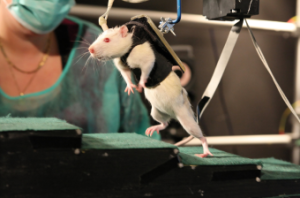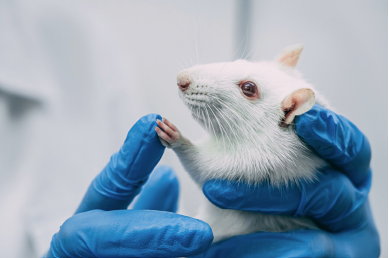The ethicality of animal testing has been a highly debated topic for years. Some regulations have been put into place, such as the Animal Welfare Act, which has been amended several times to expand its protection of more animals and specify which situations it limits. However, many still debate whether these protections are enough, or if animal testing should exist at all.
Individuals in favor of no animal testing have argued that it unnecessarily harms animals who do not deserve to be injured for the sake of science. Others, in favor of animal testing, have said that it has resulted in significant scientific, technological and medical advancements which justify its use. There are also others whose opinions fall somewhere in between, accepting animal testing to an extent–but not in excess.
Adjunct Professor for the English Department at Vanguard University, Crystal Couch, has a deep passion for helping mitigate environmental and social issues. In regard to the ethicality of animal testing, Couch firmly states it is not ethical in any capacity. She explains this opinion by saying:
“My position is based on the warrant or premise that all life is created by God, and that each life has its own inherent value. Meaning, it’s not dependent on a human assigning a “human-centric” value. I think a person can only “defend” animal testing if they refuse to see that animals have value in their own right.”
Couch approaches the issue of animal testing from a Biblical perspective, saying that:
“I have to see all other living things on this planet as fellow creatures created by the same loving God.”
She emphasizes how animals have God-given value. Any sentient being created by God doesn’t deserve to be subjected to physical, mental or emotional pain.
“I would posit that Jesus’ entire ministry was one of protecting His creation from harm. But even if there aren’t verses specific to animal testing, I don’t think that violence is what God originally intended. Genesis starts with the story of God carefully and intentionally creating every living thing and saying it was all good and loving it all.”
To help this issue herself, Couch practices a vegan lifestyle. She also has participated in three petition campaigns related to animal welfare/rights, financially supports organizations committed to different types of nonviolence and continually researches to stay informed.
While there are those at Vanguard who stand opposed to all animal testing, there are others who acknowledge the benefits of animal testing. Some animal testing even occurs on campus in certain classes to educate students on biology and psychology.
Associate Professor of Neuroscience at Vanguard University Dr. Hanna conducts experiments on rats in several of his classes–primarily looking at how drug associated memories can be formed and destabilized. He explains how his research, and other experiments like it, are necessary for breakthroughs in treatment of drug addiction, PTSD, phobias, and the like.
“Part of my research,” he explains, “is to study the neural mechanisms for drug memories, and to prevent the restabilization of those drug memories, so that the cues don’t induce drug seeking behavior or cravings.”
One of the experiments in his classes tests how rats form addictions to methamphetamine, as well as how that memory of the addiction can be “erased.” In this experiment, rats are placed in between two chambers, a white chamber and a black chamber. To start off, Dr. Hanna says:
“The rat will go to the white chamber 50% of the time, and the black 50% if you just put any rat in the middle.”
Then, to form a drug addiction in the rat, it is given an IP injection of methamphetamine in the black chamber and a saline (placebo) solution in the white chamber. After a few days, the rat associates the black chamber with methamphetamine. Dr. Hanna states:
“The rat spends more time in the black chamber, indicating that rat has formed a memory that black is associated with meth administration. I then put the rat back in black chamber for 5 minutes to trigger the memory. By triggering the memory, the memory temporarily becomes unstable. That is, the neuronal synapses responsible for the memory temporarily de-couple. I then inject the rat with a drug (a glutamate antagonist), which prevents the restabilization of the memory. The next day the rat will go back to spending equal time between the two chambers..”
Essentially, in non-technical terms, the rat’s memory of the drug cue, which would have triggered the rat’s drug-seeking behavior, has been erased. The results of this experiment, Dr. Hanna explains, are applicable to drug addiction in people. The same treatment can help “erase” the memory of the drug being associated with a certain person, place, thing, etc. which triggers a person’s drug addiction.
In regard to the benefits of animal testing, Dr. Hanna gives more examples as to how animal testing has led to medical advancements to human beings. He talks about how spinal injury treatment has been revolutionized by the use of animal testing. Before experimentation, doctors would treat spinal cord injuries with bed rest. However, after treating rats with treadmill exercise after causing them to have spinal injuries, it was found that exercise actually improved movement and healing. Now, human beings are treated in the exact same way as the rats were.

Federal Institute of Technology in Lausanne

SpinalCord.com Team
Dr. Hanna states:
“It’s because [animal testing is] translational, and goes ahead and dictates how we can really help humans. We’re not just harming them for the sake of harming them. If you look at most of the medical and therapeutic methods, most came from animal testing.”
Along with acknowledging the benefits of animal testing, Dr. Hanna recognizes the value animals have. He insists that they are important, and good scientists don’t see them as ‘just rats.’
“When a scientist kills rats, we use the term ‘sacrifice’ because we actually see that the animal is sacrificing its life for the sake of science.”
In his classroom, Dr. Hanna upholds ethical standards for animals by writing in his syllabus that any students who mistreat the rats will receive an automatic F. He includes Proverbs 12:10 as well, to instruct students how to treat animals ethically.
Professor Couch, in her class, Researched Writing, asks students to research one form of social or environmental justice, in hopes to inspire students to take action to address these issues.
She says she is encouraged by students who are dedicated to helping solve environmental and social issues, and believes that, as a whole, humans can figure out better ways of doing things. About animal testing, Couch declares:
“I have such faith in the human mind – our intelligence, our imagination, our capacity for good…I know we can come up with better ways. It’s just a matter of will.”
Animal testing certainly has support both for and against it. While animal testing has shown to result in medical advancements, there are limitations to consider. There have been many experiments where animal testing has not been applicable to humans. Guiding principles for a shift to more ethical animal testing practices, and alternative methods such as using cell-based systems, or computer programs for research have been suggested over the years.
At Vanguard, and every university, there is a specific committee to approve proposed animal experiments that are done, reviewing the ethicality of each one. Yet, some say the experiments should not be an existence at all. The ultimate question is: Do the ends justify the means?

 The Liturgical Calendar: Should Christians Observe It?
The Liturgical Calendar: Should Christians Observe It? Embracing Authenticity in the Pursuit of Success: A Reflection on Journalism, Education, and Meaningful Academia
Embracing Authenticity in the Pursuit of Success: A Reflection on Journalism, Education, and Meaningful Academia Spring Concert: Music From Around the World
Spring Concert: Music From Around the World Recycling on College Campuses
Recycling on College Campuses
Leave a Reply